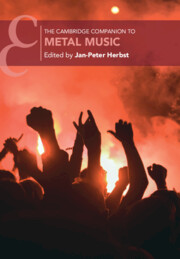Book contents
- The Cambridge Companion to Metal Music
- Cambridge Companions to Music
- The Cambridge Companion to Metal Music
- Copyright page
- Contents
- Figures
- Tables
- Notes on Contributors
- 1 Introduction
- 2 Get Your Double Kicks on Route 666
- Part I Metal, Technology and Practice
- 3 Mapping the Origins of Heaviness between 1970 and 1995
- 4 Technical Ecstasy
- 5 Not from the Mind But the Heart
- 6 Timbral Metrics for Analysis of Metal Production
- Part II Metal and History
- Part III Metal and Identity
- Part IV Metal Activities
- Part V Modern Metal Genres
- Part VI Global Metal
- Select Academic Bibliography
- Select Journalistic Bibliography
- Index
3 - Mapping the Origins of Heaviness between 1970 and 1995
A Historical Overview of Metal Music Production
from Part I - Metal, Technology and Practice
Published online by Cambridge University Press: 31 August 2023
- The Cambridge Companion to Metal Music
- Cambridge Companions to Music
- The Cambridge Companion to Metal Music
- Copyright page
- Contents
- Figures
- Tables
- Notes on Contributors
- 1 Introduction
- 2 Get Your Double Kicks on Route 666
- Part I Metal, Technology and Practice
- 3 Mapping the Origins of Heaviness between 1970 and 1995
- 4 Technical Ecstasy
- 5 Not from the Mind But the Heart
- 6 Timbral Metrics for Analysis of Metal Production
- Part II Metal and History
- Part III Metal and Identity
- Part IV Metal Activities
- Part V Modern Metal Genres
- Part VI Global Metal
- Select Academic Bibliography
- Select Journalistic Bibliography
- Index
Summary
Metal music has been undergoing a remarkable sonic development. Pioneering releases of the early 1970s by Black Sabbath already contained all essential ingredients of metal’s sonic signature. The growing need for heavier sounds was afforded by a rapidly advancing recording technology, alongside the exploration of production techniques and aesthetics. This chapter traces significant developments in metal music production from the 1970s to the 1990s by looking at key artists, albums and audio professionals to outline how heaviness in recorded form developed in the genre. Many of the analysed engineering practices were adopted, improved and have become standard in contemporary metal production. In this process, production was brought to the fore, making it an increasingly fundamental element of the music, even an art form in itself. This development led to what has become metal’s standard hyper-real aesthetic, which will most likely be pushed further in the ongoing and genre-defining quest for greater heaviness.
- Type
- Chapter
- Information
- The Cambridge Companion to Metal Music , pp. 29 - 42Publisher: Cambridge University PressPrint publication year: 2023

